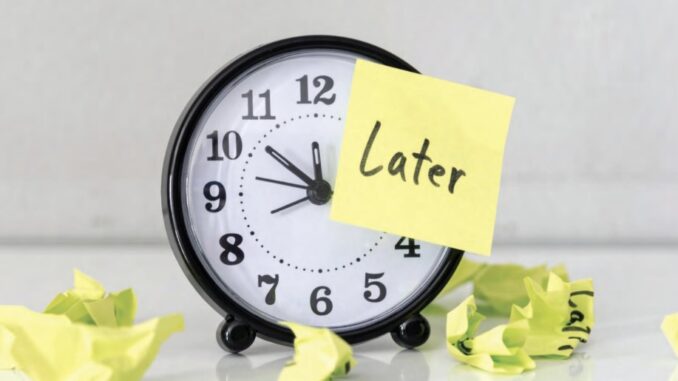
By Jodie Whitaker
Someday. It’s a word filled with promise but often hollow in its delivery. How many times have we told ourselves, “I’ll start next week,” or “When things settle down, I’ll finally tackle this”? For so many, this notion of “someday” becomes a trap—a perpetual waiting game where the “right time” never seems to arrive. This phenomenon, aptly named “Someday Syndrome,” is a silent thief, robbing us of progress, growth, and the satisfaction that comes from taking action.
The idea of waiting for the perfect moment is alluring. It’s comforting to think that tomorrow will bring clarity, motivation, or an ideal set of circumstances to pursue our goals. Yet, life rarely aligns itself in neat, predictable ways. By placing our aspirations in the hands of “someday,” we relinquish control and remain stuck in a cycle of waiting. The truth is, the perfect time doesn’t exist. What matters is the decision to begin, regardless of the conditions.
The roots of Someday Syndrome often lie in fear and perfectionism. The fear of failure, or even success, can paralyze us, convincing us that we’re better off staying in our comfort zone. Perfectionism tells us that we need the “right” tools, more preparation, or an ideal scenario to start. Together, these forces keep us stuck in inaction, convincing us that tomorrow is always a better option than today.
Breaking free from this loop requires a shift in mindset. Progress doesn’t happen when everything is perfect; it happens when we embrace imperfection and take messy, uncomfortable steps forward. Action, even imperfect action, creates momentum. Each small step builds confidence, laying the foundation for larger, more significant strides. This principle is especially important as we enter a new year—a time when resolutions and goals often feel daunting. Instead of waiting for inspiration to strike, it’s crucial to create opportunities for progress by acting now.
One way to combat Someday Syndrome is to redefine success. Often, we envision success as the final, polished outcome of our efforts. This mindset makes the journey feel overwhelming, leading us to delay starting. Instead, focus on progress over perfection. Success can be as simple as showing up—writing a single paragraph if your goal is to author a book, or taking a ten-minute walk if your aim is better health. These small, manageable actions are the antidote to inertia.
Accountability can also be a powerful tool in overcoming Someday Syndrome. Sharing your goals with a trusted friend, family member, or coach creates a sense of responsibility that motivates you to take action. When someone else knows what you’re striving for, it becomes harder to put it off indefinitely. Beyond accountability, consider breaking your goals into smaller, actionable steps. A large goal can feel overwhelming, but dividing it into bite-sized tasks makes it more approachable and easier to integrate into your daily routine.
Another key strategy is to embrace the concept of “the wrong time is the right time.” When life feels chaotic or challenging, it’s tempting to wait until the storm passes to begin something new. Yet, these moments of turbulence often reveal what is truly sustainable. If you can create habits during life’s busiest or messiest phases, those habits are far more likely to stick long-term. Starting when it feels inconvenient builds resilience and proves to yourself that progress is possible even under less-than-ideal conditions.
The environment you create for yourself can also significantly impact your ability to overcome Someday Syndrome. Surrounding yourself with reminders of your goals and keeping your tools accessible makes starting easier. For example, if you want to work out more, placing your gym clothes by your bed the night before reduces friction. Similarly, carving out a dedicated space for creative pursuits or study minimizes distractions and encourages consistency.
It’s important to recognize the role of self-compassion in this process. The journey to achieving our goals won’t be linear, and setbacks are inevitable. Instead of using these moments as an excuse to revert to inaction, practice kindness toward yourself. Acknowledge the effort you’ve made and recommit to your goals without judgment. Self-compassion fosters resilience and keeps you focused on the long-term picture rather than momentary stumbles.
Visualization can be another powerful motivator. Imagining yourself successfully reaching your goal can provide clarity and drive. Picture the impact of achieving your aspiration—how it will feel, how it will improve your life, and the pride you’ll experience. This mental rehearsal can bridge the gap between inaction and taking the first step. When combined with concrete planning, visualization transforms your goal from an abstract idea to an achievable reality.
As 2025 begins, consider adopting the mantra, “Someday is today.” This mindset challenges the inertia of Someday Syndrome by reframing today as an opportunity to act. Whether your goal is to learn a new skill, improve your health, or pursue a passion project, remember that starting small is still starting. Even the smallest effort today brings you closer to your aspirations than waiting ever will. The momentum you create by acting now will carry you forward, making each subsequent step feel more natural and attainable.
This year, let’s commit to progress over perfection, to showing up even when it’s inconvenient, and to choosing today over “someday.”
